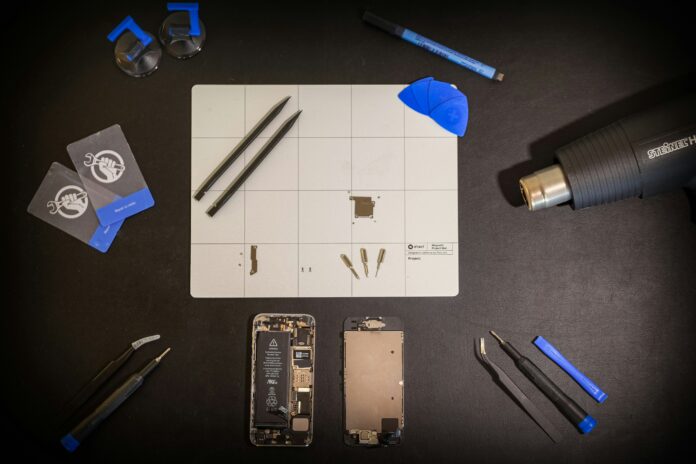
There have been a few recurring themes over the past few years in the Colorado Legislature, including taxes, real estate, healthcare and education. But one theme has consistently ended with new laws: the right to repair.
The success of the initiative began in 2022, when the legislature passed House Bill 22-1031, the Consumer Right to Repair Powered Wheelchairs. This was followed in 2023 with HB23-1011, the Consumer Right to Repair Agricultural Equipment.
The new law, following the governor’s signing of HB24-1121, the Consumer Right to Repair Digital Electronic Equipment, will likely be the bill to impact the broadest swath of Coloradans.
“When you think about the power wheelchairs bill that we passed two years ago, agricultural equipment last year, this year consumer and business electronics; it’s just really impressive, Colorado is the Right to Repair state now,” said Danny Katz, the executive director of Colorado Public Interest Research Group. “We have the broadest repair rights of any state in the country.”
Beyond Colorado
Katz noted this bill will impact a wide range of consumer and business electronics. Its regulations go into effect on Jan. 1, 2026.
“Think of everything from cell phones and laptops to blenders and appliances and refrigerators, to all of the IT equipment and servers that are in all of the buildings across the state of Colorado,” said Katz. “This bill was really focused on those kinds of core electronics, and mostly passed in the shape that it started in.”
“Colorado is the Right to Repair state now.” – Danny Katz, executive director of Colorado Public Interest Research Group.
While every company isn’t restricting repairs on their devices, some do. Katz said the law came as part of an anticipation of restrictions on repair becoming worse.
“It makes a lot of sense from a business practice,” said Katz. “If you can restrict somebody’s ability to fix something, well that is good for you from a business perspective, because that means those are customers that will have to come back and buy a new version or go through your own authorized repair, which oftentimes has higher costs because they’re not competing with anyone.”
The impact of the legislation may be felt outside of Colorado as well. Gay Gordon-Byrne, executive director at The Repair Association, told Law Week via email that everyone in the nation will benefit.
“For example — NY law, where I live, has a statute passed in 2022 that gives me the option of buying repair parts, tools and documentation only for consumer electronics made after July 1, 2023 (not even a year ago),” said Gordon-Byrne. “Colorado law will give me access to service materials going back to July 1, 2021 and includes far more types of equipment, including home appliances. Anything posted on the internet travels at the speed of light — and physical parts travel overnight.”
Gordon-Byrne anticipates manufacturers will realize the difficulty of limiting sales across state lines and thinks they are likely to offer repair materials across the nation once the statutes take effect, with several bills across the country taking effect on July 1.
The new legislation will also benefit the environment and increase sustainability, according to a statement that was shared with Law Week from Colorado Sierra Club director Margaret Kran-Annexstein.
“Right to repair can significantly help reduce waste by creating a more open market for repairing expensive technology,” said Kran-Annexstein.
Kran-Annexstein also noted the impact the metal and resources that go into making the devices has on the environment. “Right to repair laws will significantly reduce e-waste and let consumers hang on to their devices longer and shop around for cheaper, better options.”
A Decade in the Making
The right to repair legislation in Colorado has been years in the making, said Gordon-Byrne.
“Our organization was founded in 2013 with the specific purpose of promoting repair-friendly legislation, regulations and standards,” said Gordon-Byrne. “Key supporting groups include US PIRG (CoPIRG is a chapter), Consumer Reports, the Electronic Frontier Foundation — all of whom bring considerable political support in state legislatures.”
Over 270 bills, filed across 48 states and several U.S. territories, have been filed already, according to Gordon-Byrne. She noted The Repair Association’s efforts have included testifying in front of the Federal Trade Commission, engaging with the U.S. Copyright Office and testimonies in front of Congress.
Gordon-Byrne and Kran-Annexstein both gave significant credit to CoPIRG for its efforts in the right to repair space.
“CoPIRG led the way in organizing our broader coalition to support Rep. Brianna Titone (the lead on all three [Colorado] laws),” said Gordon-Byrne. “They should get the lion’s share of the credit for working through years of discussions and debates and frustrations that culminated in these laws.”
But not everyone was in favor of the initial bill. The Entertainment Software Association, an interest group that represents the video game industry, told Law Week via email that changes to the bill address their concerns.
“Video game consoles are unique from other devices, appliances and consumer products in that they rely upon a secure platform to protect users, the integrity of the video game experience and the intellectual property of game developers,” said an ESA spokesperson. “Allowing unauthorized parties to bypass the specialized software that protects video game consoles creates significant potential for piracy and security risks. We are supportive of the right-to-repair bill in Colorado as passed, as it adequately addresses these concerns in regard to maintaining the security and integrity of our consoles.”
Several other groups registered as opposed to the bill didn’t reply to requests for comment.

